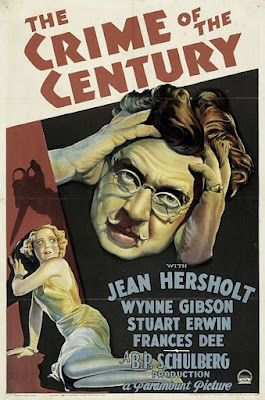 |
| Say, something's missing here... |
Director William "One Take" Beaudine appeared to have wanted talented actors to help him live up to his nickname. All the primary players are familiar (to me), even if their names aren't. It's like an all-star no-star cast, except for Stuart Erwin as Mckee, and Jean Hersholt as the wacky shrink. And yes, that's the same Jean Hersholt of the Oscar's Humanitarian Award, which Will Smith is never going to win.
Crime of the Century is celebrated for being a mystery where all the clues are laid out before you; there are no previously-unseen characters turning up at the last minute, either. And once you learn who the killer is, you realize it was obvious if you had been paying attention. A clever mystery with a carload of pros in its cast, Crime of the Century might not live up to its name, but it's great fun nonetheless.
BONUS POINTS: At roughly the one-hour mark of its 73 minute running time, Arthur Hohl (another familiar face) stops the show and explains that, because movie mysteries move so quickly, Crime of the Century will pause for 60 seconds to give the audience a chance to guess who the killer is. Damn, I wish movies were this charming now.
Gold, made in Germany, was one of those talked-about sci-fi movies that was supposed to be a classic yet difficult to find. Now that it's readily available, the movie is really a straight-ahead melodrama with a couple of really cool alchemy machines on huge soundstages. Hans Albers, the most popular German actor of his time, plays Holk, looking kind of like a Teutonic George C. Scott. Michael Bohnen was a good choice to play the British Wills since he resembles Nigel Bruce.
As with the 1945 German version of Titanic, the British are the enemies in Gold. Just to drive the point home how decadent they are, they smoke and drink while Holk abstains (as did Hitler). However, he allows himself one beer over one lunch. He is German, after all.
BONUS POINTS: It's impressive to see gargantuan sets that were made by hand rather than CGI.
MURDER BY THE CLOCK (1931): After changing her will to favor her weak-kneed nephew Herbert instead of her violent, feeble-minded son Phillip, rich old crone Julia Endicott is strangled to death. Herbert's unfaithful wife Laura had convinced Phillip and Herbert to kill her with the promise of hanky-panky to the winner. Although Herbert is the guilty party, Phillip is arrested on circumstantial evidence.
Not satisfied with orchestrating one death, Laura convinces Phillip to break out of jail to kill Herbert, while she drops a similar hint to her sidepiece Thomas. And just as Police Lt. Valcour is cracking the case, Julia Endicott -- you know, the rich old crone -- appears to have left her coffin. What a wacky family!
I've actually left out a few other of Murder by the Clock's plot twists that happen over 75 minutes. Not that it makes any sense. Murder by the Clock seems to be Paramount's answer to the Universal horror movies blowing up the box office at the time. Even for 1931, the acting and dialogue are creaky, and Regis Toomey as the comedy relief Irish cop is no help. But Lilyan Tashman is effectively nasty as the manipulative Laura, while Irving Pichel steals every scene as the mentally-defective, savage, horny Phillip, in a performance aping Dwight Frye in Dracula, and then some. He's the best reason to spend your time watching Murder by the Clock.
BONUS POINTS: Other than Irving Pichel? Well, the alarm that Julia Endicott has installed in her coffin in case she's buried alive makes a creepy sound. Hey, you gotta take the good stuff where you can.
*******************








No comments:
Post a Comment